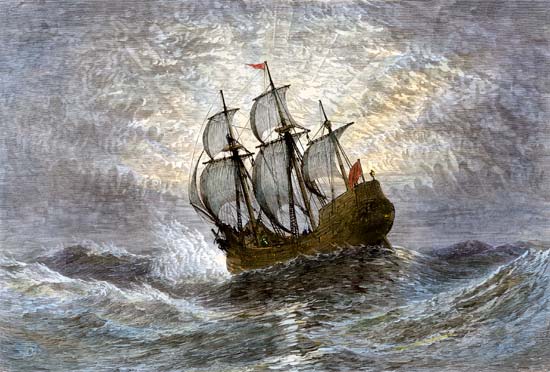Eddie Hyatt is a NAR dominionist who specializes in distorting history to pretend that the United States was an evangelical Shangri-La when founded, was somehow integral in ending slavery, instead of being one of the last countries to free theirs, and has now been corrupted somehow by anyone who runs for office that is not a Republican. Because Hyatt realizes that those who founded this country did so for economic reasons and were in obvious rebellion against Romans 13, he often tries to go deeper into history to justify his politics. While he is usually fond of pretending that 1726 is the year we should focus on because of the great awakening, the article above goes back to the Pilgrims, I assume to make a connection to Thanksgiving. Yet because history generally disagrees with his subterfuge, Hyatt has to be duplicitous even about this. So, let us reason once more together beloved.
"I was presenting a "Revive America" event at Abounding Grace Christian Church in Schenectady, New York, when the Lord highlighted, in a somewhat dramatic fashion, the Pilgrims' purpose in coming to America. I was preparing for an evening session when I sensed the Holy Spirit instructing me to have the audience repeat after me the two reasons the Pilgrims gave in the Mayflower Compact for coming to America. Later that evening, at the appropriate moment, I had the words of the Mayflower Compact flashed on the large screen and asked the audience to read aloud with me their two reasons for coming to the New World. We read together: 1) for the glory of God and 2) [for] the advancement of the Christian faith. We then read it a second time." - Eddie Hyatt
Eddie just cannot help himself but to be deceptive. The actual text he references has more than the two listed reasons as it reads:
"Having undertaken for the glory of God, and advancement of the Christian Faith, and honor of our King and Country, a Voyage to plant the first Colony in the Northern parts of Virginia; do by these presents solemnly and mutually, in the presence of God and one another, covenant, and combine ourselves together into a civil body politick, for our better ordering and preservation and furtherance of the ends aforesaid; and by virtue hereof do enact, constitute, and frame such just and equal Laws, Ordinances, acts, constitutions, and offices from time to time, as shall be thought most meet and convenient for the general good of the Colony; unto which we promise all due submission and obedience." - Mayflower Compact
Hyatt conveniently leaves out the bulk of the compact, including taking on this journey for the honor of king and country, having nothing to do with religion. The remainder of the compact shows an allegiance not to God per se but to the colony. All submission and obedience is not to the bible or God but to the general good. Now, it was obviously true that the Pilgrims were religious and were seeking to escape religious persecution. But to cast them as a religious monolith that was just seeking to spread Christianity is beyond rewriting history.
"At the end of the service, a young man, who looked to be about 20 years of age, approached me with his face glowing and a note of excitement in his voice. He said, "I am attending a local community college and taking a course in American history. Just this week the professor told us that the Pilgrims did not come here for religious reasons. He said they came for monetary reasons." He paused and then exclaimed, "But there it is in their own words!" He then stated how he was now inspired to study and teach America's true origins. I then understood why God had instructed me to have everyone speak aloud the two reasons the Pilgrims gave for coming to America. Indeed, even before the Mayflower Compact, while still in Holland, the Pilgrims' missionary vision was clearly stated. William Bradford, who served as governor of Plymouth Colony for over 30 years, explained why they made plans to come to America. He said that they had "a great hope and inward zeal for the propagating and advancing of the gospel of Jesus Christ in those remote parts of the world" (Hyatt, "The Pilgrims," 25)." - Eddie Hyatt



